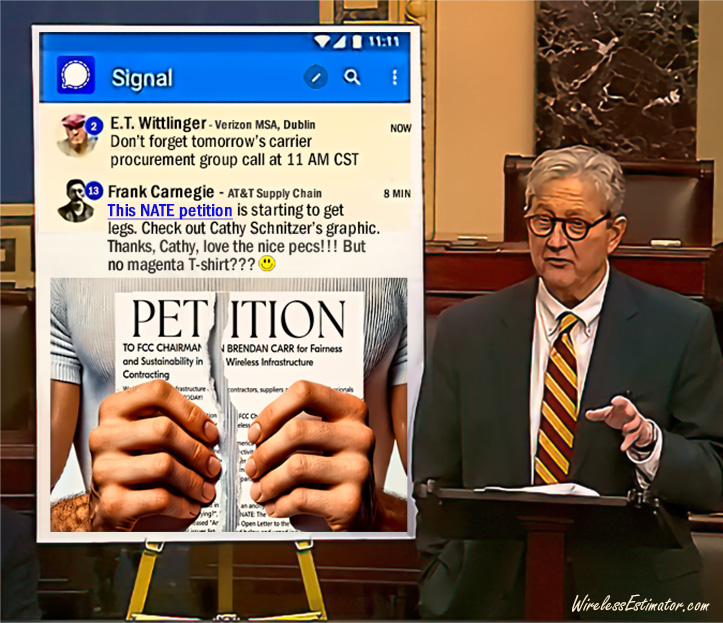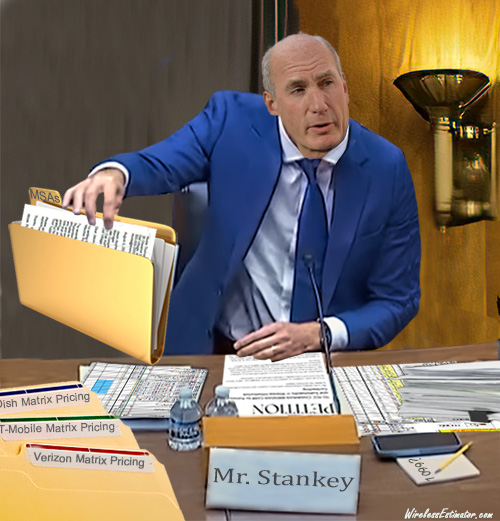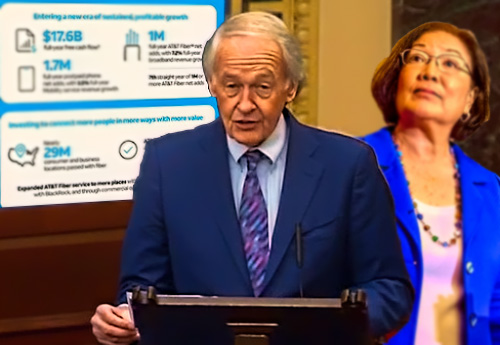
Senator John Kennedy (R-LA) grilled three CEOs of the nation’s four largest mobile carriers who agreed to testify yesterday, documenting that their contractor and supplier pricing practices were collusive. His U.S. Senate Committee on Small Business and Entrepreneurship has recommended that the Department of Justice and the Federal Communications Commission launch an investigation into what he described simply as an “oligopoly goat rodeo of greed.”
WASHINGTON — At a tense hearing before the U.S. Senate Committee on Small Business and Entrepreneurship yesterday, CEOs of the nation’s top wireless carriers faced sharp criticism over alleged collusion and the use of fixed matrix pricing—practices that lawmakers say are driving contractors, suppliers, and key players in the telecom supply chain into financial ruin, with many forced to shut down entirely.

When Verizon CEO Hans Vestberg gave a vague and evasive response to Senator Rand Paul’s (R-KY) question about carriers knowingly using illegal 1099 contractors, it drew a mix of confusion and carefully measured disdain from fellow panelists (L to R) AT&T CEO John Stankey, Dish Networks CEO Hamid Akhavan, and T-Mobile CEO Mike Sievert—each seemingly striving to maintain plausible deniability regarding their own companies’ practices. However, an investigation by the FCC and DOJ, as called for by Senator Kennedy, may challenge the validity of such denials.
In a heated exchange, Chairman Senator John Kennedy (R-LA) lashed into AT&T CEO John Stankey, accusing the nation’s top mobile carriers of knowingly operating as an oligopoly—a potential violation of antitrust laws under the jurisdiction of the Department of Justice.
“They don’t just act like an oligopoly,” Kennedy said. “They know they are one. Y’all have carved up the market like a Sunday ham, fixed prices behind the curtain, and called it strategy. But let me tell you—if it walks like collusion and bills like collusion, it ain’t free enterprise. It’s a cartel of carrier CEOs in Versace suits.”
Overwhelming evidence is presented at hearing
Kennedy said that the committee had gathered substantial evidence showing that carriers have been sharing contractor pricing matrices, setting rates based not on site-specific work assessments but on the “going rate”—effectively eliminating competitive bid processes.
“They’ve swapped cigars and backrooms for Zoom calls — but it’s still the same price fixing game,” Kennedy said.
“And it’s driving contractors out of business. The Department of Justice and the FCC ought to take a real close look at how y’all are doing business—because from where I’m sitting, it sure doesn’t smell like capitalism.”

AT&T CEO John Stankey holds up a folder containing newly presented documents detailing concerns over unsustainable matrix pricing, potential collusion, and indesputable evidence that many contractors across the country are being forced to shut down due to predatory pricing practices and master service agreements that restrict inflationary pricing, and tariffs, and require the contractor to provide warehousing and other services that are not compensated.
“Mr. Stankey, our committee has reviewed a whole heap of documents that my aide has put in front of you—emails, internal pricing sheets, contractor statements—and I’ll be blunt; it looks like all the major carriers, including AT&T, have been sharing matrix pricing with each other like casserole recipes at a church potluck,” asserted Kennedy
“This isn’t healthy competition—this is a closed-loop system where you all price off each other instead of allowing contractors to walk the job and figure out what the work requires. You’re not allowing bidding. You’re benchmarking. And the benchmark is always stuck in the basement,” said Kennedy.
Stankey, nervously holding a file of MSAs, replied, “Senator, I would respectfully say that a complex interplay of market dynamics, resource allocation models, and vendor alignment strategies shape pricing across the industry. I’m unaware of any coordinated or untenable matrix pricing behavior beyond standard market referencing. I believe…”.
However, before he could continue, Kennedy cut him off, visibly trying to control his frustration, stating, “Mr. Stankey, that was a beautiful bowl of word salad—you even threw in some croutons with ‘vendor alignment strategies.’ But let me translate what I just heard. Y’all provide the same take-it-or-leave-it pricing because that’s what the other guy’s doing. That’s not competition—that’s synchronized swimming in a swamp of collusion. And meanwhile, the little guy—the contractor—is getting squeezed like a lemon at a crawfish boil.”
Senator Hirono believes contractors should be thankful for carrier largesse

Senator Mazie Hirono (D-HI) stood as the lone dissenting voice on the 19-member committee that voted to urge the DOJ and FCC to investigate what they allege is an industry oligopoly deliberately driving down contractor pricing. Senator Ed Markey (D-MA) didn’t hold back in his criticism of AT&T, stating, “Here you have a company that pulled in $122 billion in revenue last year, with $39 billion in cash from operating activities — enriching shareholders while contractors are left to struggle.”
Senator Mazie Hirono (D-HI) said she “took umbrage with her colleagues across the aisle,” arguing that limiting carriers’ ability to set pricing would mean “America could lose the race to G5”—then quickly corrected herself: “I mean 5G… G5 is the model number of the 83-inch LG TV that a telecom lobbyist just dropped off.”
The room fell silent for a beat—some unsure if she was joking.
Hirono explained to a concerned and frowning Sievert, who has always smiled in any video or photograph published, “Critics are calling your orchestrated contractor pricing ‘collusion,’ but to me, it looks like alignment. Isn’t that what we want in a well-functioning market—everyone on the same page?”
“Frankly, I think our contractors should be thanking you, Mr. Sievert. No haggling, no surprises—just one simple, standardized rate. It’s like ordering off a prix fixe menu. That’s not anti-competitive—that’s customer service.”
Swede’s Irish charm falls flat in addressing illegal 1099 contractors
When Senator Rand Paul (R-KY) questioned why contractors held grave concerns over how Verizon’s MSA team in Ireland shaped matrix pricing in the U.S. and their lack of concern regarding illegal 1099 contracting, Vestberg attempted a folksy, down-home, Kennedy-type reply. Still, it fell flat, with Senators almost unanimously shaking their heads.
“Senator, I was completely unaware there was any issue. I mean, Ireland is really, really far from New York—even on the internet. Plus, have you heard their accent? Half the time, I have no clue what they’re saying. It’s worse than a Swedish accent, which is like IKEA instructions—sounds simple, but halfway through, contractors and suppliers are completely lost and just nodding along, hoping for the best,” he said, glancing at the Senators, clearly waiting for a chuckle… that never came. Instead, he was met with stone-faced silence, with only a pen slowly clicking in judgment.
Unsurprisingly, Akhavan wasn’t asked any questions about Dish Networks’ alleged collusion or pricing. Because everyone already knew the drill: he’d rattle off polished phrases like “strategic rate alignment” and “competitive parity” while ignoring the reality that contractors are shutting down under the weight of those so-called strategies.
“It’s hard to stomach a lecture on ‘shared success’ from executives who indirectly sign off on matrix pricing that hasn’t covered labor costs and inflation in five years. While execs cash stock options, the people actually building the networks–and I’ve met quite a few of them– are being handed scraps and told it’s market-driven,” said Senator Ed Markey (D-MA).
“And yet, somehow, they still expect contractors to show up on time, absorb the risk in a very dangerous profession, meet every deadline, and smile through it—like gratitude should be part of the compensation package. If hypocrisy were a line item, it’d be the only thing in the carriers’ OPEX budget that’s fully funded,” he said.
Senator Kennedy calls for contractors to just say ‘No’
In a closing statement, Senator Kennedy looked out across the hearing room, his eyes settling on two rows of contractors — some exhausted, some angry, most just tired of fighting for survival. He took a long pause, nodded slowly, and said, “I see y’all. I see the miles on your boots, the strain in your eyes, and the weight you’ve been carryin’. You didn’t come here lookin’ for sympathy — you came here for change. And if the regulators won’t step in and fix this oligopoly that’s bleedin’ you dry, then you’re left with one option: stand together and say, ‘No.’”
“No to prices that put you in the red before you even start the job. No to contracts that treat your work like it ain’t worth a dime. And no to bein’ divided while the big boys keep cashin’ in. Because let me tell you — if we drive out the skilled contractors who know how to build, maintain, and secure these networks, we’re not just talkin’ about business failures. We’re talkin’ about opening doors for foreign adversaries to breach, disrupt, and even destroy the communications systems that keep this country running and safe.”
“You’ve got more power than you think — but only if you use it together. Say no, stand tall, and remind ‘em: you built these networks. And you sure as hell don’t have to continue to build and maintain ‘em for free. Tell ’em that if they can’t provide decent and fair pricing for your work, they can kiss the portion below your Louisiana love handles!”
 As always, we couldn’t resist seeing how far we could string you along before you realized it’s April Fools’ Day.
As always, we couldn’t resist seeing how far we could string you along before you realized it’s April Fools’ Day.
But beneath the tongue-in-cheek tone of our fictional Senate hearing lies more than just a kernel of truth — in fact, everything mentioned is entirely accurate, simply wrapped in an April 1st disguise.
Contractors nationwide are forced to close their doors due to unsustainable pricing models — a crisis Wireless Estimator has exclusively investigated and reported on for years. Most recently, an anonymous but long-established contractor provided an indisputable timeline exposing the depths of corporate greed. After its publication, NATE issued an open letter to the wireless industry.
NATE: The Communications Infrastructure Contractors Association has advocated for contractors and suppliers for years. Their recently published petition — expected to garner thousands of signatures — will soon be submitted to FCC Chairman Brendan Carr. Fortunately, NATE’s advocacy is gaining momentum, with growing support from fellow industry associations and lawmakers who recognize the urgent need for reform.
One thing is clear: the nation’s carriers have officially been put on notice — change can’t wait.
If you’re a contractor or supplier or believe in fair business practices, now is the time to SIGN THE PETITION. Your information will remain confidential.
Stand together — because the future of America’s communications infrastructure depends on it.
Additional April 1 exclusive and investigative Wireless Estimator articles can be found here:
Interagency squabble ends with OSHA requiring the nation’s revered raptors to harness up
 Nationwide strike of contractors averted after carriers and towercos agree to meaningful concessions
Nationwide strike of contractors averted after carriers and towercos agree to meaningful concessions
From monopoles to barber poles, NWSA adds a new certification to buoy lack of broadband funding
FCC to unveil breakthrough technology to replace billion-dollar spectrum bids
New structural corset could sound the death knell for tower technicians’ retrofitting work
Huawei CFO’s release requires her to show how she swapped out cell site circuit boards
Giant step back for mankind: Supreme Court scrubs Nokia’s 4G Moon network launch
Ivanka puts in a hostile bid for 3M, wants crown jewel DBI-Sala
Guyed tower collapses on White House lawn hurling lighting debris into President’s office
Anritsu’s global success tagged to God and one misspelled word in 1844
American Tower takes AT&T to court and wins a $132 million judgment
From broadband to a blues harp, PCIA Chief splits his time with Broadway

















